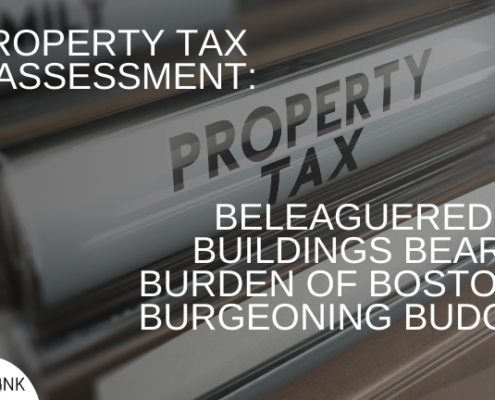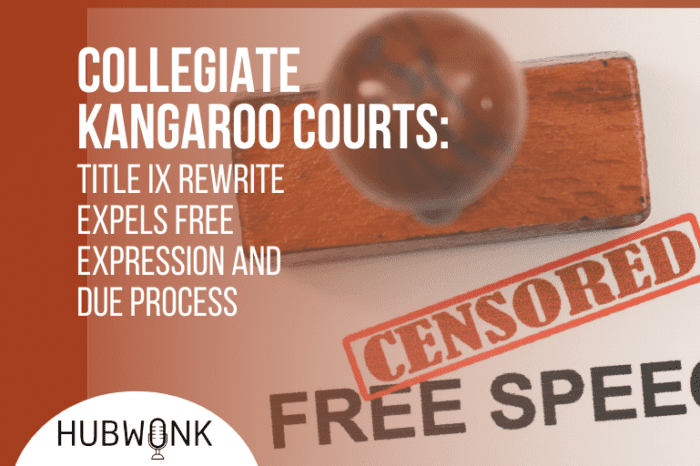Collegiate Kangaroo Courts: Title IX Rewrite Expels Free Expression and Due Process
/in Featured, Podcast Hubwonk /by Editorial Staff
This week on Hubwonk, host Joe Selvaggi talks with Pacific Legal Foundation Senior Fellow Alison Somin about the Biden Administration’s proposed modifications to Title IX fair treatment guidelines, challenging principles of free speech and due process, and potentially chilling the culture of free debate in American universities.
Guest:
 Alison Somin joined Pacific Legal Foundation in May 2020 as a legal fellow in the Center for the Separation of Powers and part of the equality before the law practice group. Before joining the Pacific Legal Foundation team, Alison was a special assistant and counsel for over a decade to Gail Heriot, a member of the bipartisan United States Commission on Civil Rights. She also has deep roots in the liberty movement. Alison was a Koch Associate at the National Federation for Independent Business Legal Foundation and, during law school, completed summer clerkships at the Institute for Justice and the Charles G. Koch Charitable Foundation. She holds a J.D. from Emory University School of Law and an A.B. in history from Dartmouth College. Her work has been published in the San Francisco Chronicle, the Daily Journal, Texas Journal of Law and Politics, and The Federalist Society’s Engage magazine and blog.
Alison Somin joined Pacific Legal Foundation in May 2020 as a legal fellow in the Center for the Separation of Powers and part of the equality before the law practice group. Before joining the Pacific Legal Foundation team, Alison was a special assistant and counsel for over a decade to Gail Heriot, a member of the bipartisan United States Commission on Civil Rights. She also has deep roots in the liberty movement. Alison was a Koch Associate at the National Federation for Independent Business Legal Foundation and, during law school, completed summer clerkships at the Institute for Justice and the Charles G. Koch Charitable Foundation. She holds a J.D. from Emory University School of Law and an A.B. in history from Dartmouth College. Her work has been published in the San Francisco Chronicle, the Daily Journal, Texas Journal of Law and Politics, and The Federalist Society’s Engage magazine and blog.
Get new episodes of Hubwonk in your inbox!
WATCH:
Read a Transcript of This Episode
Please excuse typos.
Joe Selvaggi:
This is Hubwonk. I’m Joe Selvaggi.
Joe Selvaggi:
Welcome to Hubwonk, a podcast of Pioneer Institute, a think tank in Boston. Title IX, a law passed in June 1972, prohibits federally funded educational institutions from discriminating against students or employees based on sex. Its intent, clearly stated is that, “no person in the United States shall on the basis of sex be excluded from participation in be denied the benefits of, or be subjected to discrimination under any education program or activity receiving federal financial assistance.” 50 years later, this past June, Education Secretary Miguel Cardona proposed rewriting Title IX to better reflect the ideological orientation of the Biden Administration, triggering a two-month window for public comment, which closed last week. That window received more than 200,000 comments revealing widespread alarm that the worthy goals of Title IX could be distorted in a way that redefines harassment dispenses with due process and blurs the boundaries of the locations where violations may be enforced.
Joe Selvaggi:
Concerned observers should examine whether this redefinition of Title IX is a welcome and useful modernization of an outdated law, or rather, an ideologically driven misstep that undermines the original important goals of Title IX. Chills the culture of free debate within universities and leave students and faculty careers vulnerable to the assertions of any who take offense. My guest today is Alison Somin, legal fellow in the Center for the Separation of Powers at the Pacific Legal Foundation. Ms. Somin has researched and written extensively on Title IX’s interpretation and implementation. Ms. Somin will share with us a history of Title IX, including ways its application has evolved over the past 50 years. You will also discuss how they’re recently proposed amendments could affect the rights of students and faculty to speak and the recourse of those accused within its new enforcement regime. When I return, I’ll be joined by Pacific Legal Foundation Legal Fellow, Alison Somin. Okay, we’re back. This is Hubwonk. I’m Joe Salvaggi, and I’m pleased to be joined by Pacific Legal Foundation Legal Fellow, Alison Somin. Welcome to Hubwonk, Alison.
Alison Somin:
Hi. It’s great to be here.
Joe Selvaggi:
Well, before we start, I think it’s only fair to our listenersthat you’re long overdue for a visit to Hubwonk. Given that I’ve already hadIlia, your husband, on several times. I just want to say, in my defensemy explanation is I wanted to have a little more practicebeforewith my interview skills before I had you on. So welcome to the show.
Alison Somin:
Thank you. It’s good to be here.
Joe Selvaggi:
All right. Now we’re going to talk about Title IXa law that actually was passed. I was surprised to learn in 1972 back in the Nixon administration, and so it’s just passed its 50-year anniversary. So, for our listeners who are unfamiliar with the topicwhat is Title IXboth in letter and in spirit? How does it help us?
Alison Somin:
So, Title IX is, as you say, in 1972 law that prohibits discrimination on the basis of sex by all recipients of federal funding. So that includes virtually all K-12 public schools and virtually all colleges and universities. It’s perhaps best known for its impact on sports teams, on trying to make sure that men and women have equal opportunities in athletics. But its reach certainly isn’t limited to that. It covers any area where there might be sex discrimination.
Joe Selvaggi:
Okay. So you paint and broad strokes, it’s institutions of higher learning thator of education that receive federal funds. What percentage is that? Is that everybody, or is that just a small percentage of, of schools out there?
Alison Somin:
I don’t know the exact percentage. My off the cuff estimate be something like 99%. Virtually all colleges and universities take federal funds in some form. Probably the biggest chunk is through the student loan program, because almost all colleges have some students who receive federal student loans. I believe that there are a couple schools that are conscientious objectors including notably the conservative leaning Hillsdale College in Michigan, but they’re pretty few and far between.
Joe Selvaggi:
Okay. Now we’re talking about sort of the evolution of the, the law, which seems to have very, very good intent, which is we don’t wanna discriminate based on sex, so we’re gonna make sure everybody gets fair treatment. At the beginning. Did the law anticipate the need for fair treatment? I’m gonna use women and men. I, I know it can go the other way, but was it, did it originally anticipate protection from violence or threatening behavior from, I’m gonna say from men to women, but agree, men to men or women to men. Did it anticipate those problems?
Alison Somin:
So in the sense of whether Congress was talking about that, if one looks back at the legislative history at the Florida debates, no, there was little or nothing about those kinds of concerns in the congressional record in the 1970s.
Joe Selvaggi:
So it really wanted to ensure that just was a fair shake at school. That one wasn’t being discriminated based on sex. Really a great deal has, has come to, to this law in, in the, in the meantime. So so as it’s evolved we’ve needed to define what constituted environment that made women less able to learn. I guess the essence of those, those additions to the law were that though they got equal funding for sports teams or programs perhaps a woman’s experience in a school was less than a man’s, or therefore she had less access to the education there o owing to some sort of hostile environment. Say more about how this concept evolves that, that a someone’s education needsthe defense of Title IX owing to either a hostile environment or something like that.
Alison Somin:
Sure. So before Title IX came about in 1964, there was title seven of these Civil Rights Act, which applied to employment to employers who had more than 15 employers. The concept of sexual harassment law was developed in cases involving employment and was later exported into the Title IX context, because Title IX has nearly the same wording as the Civil Rights Act prohibition on sex discrimination. It is kind of an odd fit because when most, if you ask somebody on the street to explain why sexual harassment or sexual assault is wrong, they’re not usually going to lead with it’s wrong because it’s a form of sex discrimination. They’re going to lead with. It’s wrong because it’s inherently wrong. It diminishes what else? Someone’s sense of consent or it diminishes a woman’s or target sense of autonomy over her own body. Nonetheless, because this was the statutory language that feminists had these cases got brought, and the original cases from the 1970s, 1980s often had quite egregious and sympathetic facts. The title I case that first applied sexual harassment in the context of federal funding recipients Davis versus Monroe County, really did have terrible facts about the plight of that little girl. The school district really was deliberately indifferent to the, to the situation that she faced.
Joe Selvaggi:
Yeah, I didn’t mean to diminish the, the moral component of, of discrimination or harassment, rather just the, the legal definition of it. You know, I I know it’s morally wrong, you know, it, it’s just, I I would think that from a Title nine perspective, it interferes with the purpose of Title I, which is to ensure equal access to education.
Alison Somin:
So I agree with that. I just think that it was kind of an odd conceptual leap for the courts to go from a statute that was based on discrimination into this area, which is traditionally more the province of tort law or a criminal law, and try to graft that kind of toward criminal law regime onto what was a discrimination statute. And I think that some of the problems, intentions that we see in this area come from courts and a and agencies trying to use a discrimination statute to take on these kinds of moral problems that, again, have more traditionally been in the bail w of something like torts or criminal law.
Joe Selvaggi:
This is a, this is a good point. So regardless of how it got into it or has interpreted to be included in Title I, whether it’s a rational leap or a you know, an odd one it’s there, there so in, in the process of forbidding, let’s say, harassing behavior, you know, reprehensible behavior perhaps one was to also have a process for a adjudicating, again, this is, we’re we’re talking about the law or a, a pseudo law when in the context of an educational institution how have these rules evolved? Meaning when one breaks those rules, how, how have they been adjudicated, let’s say, from 1972 to to current times?
Alison Somin:
So, in theory, Title IX doesn’t really say that from the plain text. Doesn’t really say anything about how schools have to adjudicate these kind, these kinds of claims. However, once courts interpreted Title IX to say that schools had an affirmative obligation to respond to these kinds of claims of sexual harassment and assault most schools put into place some kind of disciplinary procedure to make sure that they weren’t just throwing accused students out of school will out of, out of school willy-nilly. In the Obama administration Catherine Layman who is then the Assistant Secretary of Civil Rights is now back in that job for a second time around, really made a push to get schools to crack down on students who accused of sexual assault or harassment. She issued a series of informal guidance letters that was, that were intended to make sure that schools really responded vigorously to these kinds of complaints.
Alison Somin:
Usually, though not always from female students and schools who were understandably nervous about losing a big chunk of their federal funds responded by leaning hard in the direction of cracking down on accused students, mostly again, but not all male, to the point that one started seeing these stories in national media about, again, mostly young men who felt that their schools had responded unduly harshly to very thin accusations. One problem in the traditional criminal law system first there’s investigation that’s usually conducted by police officers, and then there’s a prosecutor who he who pushes for the charges. And there’s an independent judge who is, who is entitled to make final decisions in the Title IX context. Instead of having these separate people who are supposed to check each other’s biases and make sure that no one person is overreaching, a lot of schools were encouraged to use what’s called a single investigator model, whereby there’s basically one person at the school who serves as investigator, serves as judge judges, jury heart serves as prosecutor. And so if that person is biased against the accused student, that accused student is really in a vulnerable and unfair position. One of the important reforms of the Trump Appointee Department of Education was to say, No, you can’t do this anymore. Unfortunately, proposed Title I rule would bring back those single investigators, and that’s one point that we discuss in our Title IX comment letter on the Pacific Legal Foundation.
Joe Selvaggi:
Sure. I wanna unpack a lot of what you just said, but let’s take it one piece at a time. What you’ve said is now that the federal government sort of as a condition of all the funding it provides, it says, you have an affirmative responsibility to ensure that this harassing and bad behavior doesn’t happen. And if you don’t do that, we will perhaps suppress or hold back money. So, in response, schools impose these, these processes that adjudicate these cases. In the past they have been fairly strict, again, maybe they’ve made the national media where they’ve portrayed something akin to a kangaroo court where a male, usually male, but not always male defendant is, is assumed to be guilty. And the process is, you know, seemingly very unfair.
Joe Selvaggi:
Betsy DeVos in the last administration, or the Trump administration tried to impose, let’s say, what we consider normal parameters of, of, of due process. As you say, there’s an investigator and impartial judge in and a, a very elaborate process. And what we’re talking about in the modern times in, in your recent comment piece in, in the news and your letter is that we are thinking about rolling back and going back from what we might consider due process defense of a, an accused student more towards, again, I use it with term karu court, but what you would characterize it as, as a, a single person, be they objective or not, who will find the facts determine guilt and impose a penalty with very little recourse from from the defendant. Have I summarized your your account fairly well?
Alison Somin:
Yes.
Joe Selvaggi:
Okay. All right. All right. So this brings us all to modern times when we’re talking about making substantial different changes to Title I actual, you know, we, we’ve spelled out what what would go from yesterday end to tomorrow. We’ve just ended a was it a two month comment period whereby the federal government said, This is what we’d like to change. We’d like you to make comments. I believe there were 200,000 comments, some of them more, more alarmed than others. Those was among the more alarmed. So you laid out very clearly what you thought was the difference between what had been the rule, again in the past administration and what is proposed to be the new rule. And you laid out some really what I thought very alarming observations of those changes. And I think our listeners, be they, the left or the right, might also be alarmed by what, what the the future may hold. So let, let’s take it apart one at a time. Let’s talk about the principal whereby you know, we don’t want students be they male or female to be harassed or be be in a classroom where they feel they can’t learn owing to, you know, some harassment by some other student or, or, or professor. How is the term harassment being redefined or defined both in the past and what would be the new version of harassment?
Alison Somin:
Sure. So the Supreme Court in the landmark 1995 case Davis versus Monroe County, in interpreted Title nine to reach sexual harassment that is severe, pervasive, and objectively offensive. And in doing so, that definition, essentially safeguards protect protected speech under the First Amendment. So, speech about politics that touches on matters of sex and gender, or very isolated incidents. Someone asks someone else out, and then that person says, no, that kind of relatively minor incident would not be swept in because it’s not considered severe. And if it’s happening once, it’s not very pervasive.
Joe Selvaggi:
I see
Alison Somin:
Department of Education, however, redefines that rule to reach harassment that is either severe or pervasive. So, in theory, something that’s not really very pervasive, but strikes the decision makers and Department of Education as severe could be brought in. And that encourages federal, federal funding recipients, colleges and universities, K-12 schools, to really crack down on anything that could put putatively be sexual harassment even something that doesn’t really seem very significant.
Joe Selvaggi:
Yeah, there seems to be a lot of tension there between our sort of First Amendment rights to say things that are even offensive or hateful, perhaps. And, and one’s a prerogative or a right to not hear those words, one thinks of going to college to encounter views we don’t agree with, But this seems to, in a sense merely allow someone to regard either a remark or perhaps a subject area or perhaps a research topic as being offensive a and causing harm. And to me, this is like the antithesis of, of a university environment whereby the one does not want to be harassed, sexually harassed. One does want to be let’s say free to hear things that one might consider severe. Explain to me how, let’s say you would imagine that this tension between the First Amendment and these new definitions of harassment could possibly be resolved.
Alison Somin:
So I think that there are a few things that the Department of Education could do to at least make it better, even if it woman wouldn’t eliminate the problem altogether first just go back to the old definition of harassment, severe and pervasive, and that would make it clear that relatively rare instances aren’t covered. Second, I’d like to see the Department of Education at an explicit safeguard that anything that covers matters of public affairs. So somebody says something controversial about sex, sexual orientation, gender identity, but it’s just speech. It’s not something that’s targeted in a particular person or that has a physical component. That kind of speech about public affairs would not be covered. Third, there have, there’s been some concern that the Herman’s definition could reach research activities in a different matter. My public interest firm, Pacific Legal Foundation represents an otologist, and part of what she teaches her students is how to classify bones as male or female in many areas of archeology.
Alison Somin:
That’s helpful to find out information about what gender roles or what kinds of different activities in a, in in a, in a tribe of, in a tribe of a Native Americans or in people from a cave civilization what their lives were like. However, there’s been a move among some archeologists and osteologists to avoid classifying skeletons as male or female on the theory that this is transphobic, because you can’t possibly know the inner gender identity of a skeleton. And so, in the sufficiently heightened in charged political environment someone could arguably claim that she’s engaging in discrimination based on gender identity by teaching her students how to classify skeletons based on their status as male or female, or that by publishing in ways that point to these sex of a skeleton, that this is arguably transphobic. We wanna make clear that research of the kind that Professor Weiss does that touches on sensitive issues or under your identity that can’t qualify as, as sexual or gender identity harassment under the rule research free inquiry scholarly debate should be explicitly protected.
Alison Somin:
Fourth, there’s a provision that interprets Title IX to reach off campus speech that’s purely online. So say somebody posts something to a personal Facebook or Twitter account that’s about, that’s, that’s about sex sexual orientation, gender identity, even if that’s not coming onto the campus environment because the person’s doing that at her house over Christmas break or something that could arguably constitute harassment under this rule. We think that this broadens the rule significantly and its reach. And so therefore, we recommend that because Title IX classifies harassment as discrimination taking place in an education program or activity, that the problem of education makes clear that it shouldn’t reach this kind of off campus, purely online speech.
Joe Selvaggi:
Wow. I think probably our listeners are heads are exploding. The notion that, I don’t know if I’m gonna get in trouble for this, but the dimorphic nature of human as, as mammals, the 50, I think there’s 5,400, if I remember species of mammals male and female. If we acknowledge that either in our science or in our offline social page, we make, get in trouble so much trouble in fact that we may lose as our space in our esteemed university or in our faculty position. You know, I, I’m having a hard time understanding this myself. But you know, I’m, I’m, I’m holding on for dear life here. I’m, I’m, I’m appreciate your, your your testimony here. So let’s say we have gone down this terrible road and acknowledged that Native Americans did have different roles for men and women and we do our research and we get in trouble. What is the the process for for adjudicating this you know, who can be the accuser? Is it, does it have to be the person in the classroom or someone who heard it in the lunchroom? And what is the recourse when one is AC accused in general?
Alison Somin:
Well, we don’t devote a lot of attention to the smart particular comment, but one potential problem with this rule is that it does recognize what it calls third party accusers, such that even if somebody’s not actually directly involved in a particular instance of alleged harassment he or she can still report it to the Title IX office at a school, and they’re still bound to investigate in that, in, in that instance. And that does open up an institution’s potential or an individual’s potential liability under Title ix. And that’s of some concern, as you and I were talking a little bit about earlier. There are significant due process problems with this rule. One major one is that it does allow institutions to, again, use a single investigator model where a single individual who’s the Title IX coordinator can essentially act as judge jury investigator.
Alison Somin:
And so if that individual is biased against an accused person then that accused person is in a very vulnerable and unfair position. And that’s something that we at Pacific Legal Foundation think is inconsistent with basic principles of due process. And so that part of the rule should be change. In our comment letter. We also talk a little bit about the importance of this safeguard of cross examination. In the 2020 rules issued by Secretary DeVos and her appointees, they made clear that in instances where credibility mattered accused students have the right to cross examine not necessarily personally, individually, but through an attorney or through another advocate the witnesses in a Title IX proceeding. That’s an important safeguard to make sure that people are telling the truth, that they don’t just fold up under the heat of some tough questions. While there are issues about wi about people feeling uncomfortable with cross examination or facing inappropriate pressure, I believe that the 2020 will handle those issues adequately. And so to remove the cross examination safeguard is in the view of my Pacific Legal Foundation, colleagues and me, a very important breach of due process, and we urge the department to bring back those safeguards.
Joe Selvaggi:
Yeah. again, I’m trying not to be overwhelmed. To me, i, I, your work is worthy but it seems like you’re holding back the tide with a broom. I, I, I have to imagine though, the chilling effect that all of these rules have in an academic setting whereby one isn’t free to even, you know, share one’s life work if it doesn’t align with modern ideology. And one, even if one can defend it one has to hope for the the kind consideration of the adjudicator, right? Without any defense. And, and with no one to scrutinize the validity of the accusation, you’re really the subject of the whim of, of the school in that case. So you, you, you alluded to a fact that I think it’s also important and I just wanna make sure I understand.
Joe Selvaggi:
When we talk about these Title IX rules, they were specifically designed to affect behavior in, in an academic or in a school setting. But that this new guideline has sort of erased that boundary between behavior that happens in a classroom or in a, in a study environment, in a research environment. And what my, you know, might happen in the down the street at the, at the black cat in the, in the cafe, at the you know, on campus share more with our listeners where if, if there is any sort of legal or, or principle that that limits what one can do, or one, once one enters the world of academia. One is subject to saddle Title ix morning, noon night.
Alison Somin:
So I believe the statute says discrimination in an education program or activity. And so the question becomes, when does discrimination that’s outside of the school become discrimination in an education program or activity? If you’re studying abroad with your school, or if you’re on a school trip for sports debate, something like that. I think that’s the case of discrimination outside the school. That is discrimination in an education program or activity. But for the reasons you suggest if one of your classmates writes a nasty Facebook post while off campus and you see it later, I just think that’s sufficiently attenuated from the education, from the education program or the education environment to qualify as being an education program or activity. And so I don’t think it’s appropriate for the, a department to issue rules that would make an institution responsible for this kind of speech or that happens elsewhere.
Joe Selvaggi:
Yeah. Again, I don’t wanna wax toophilosophical here, but it seems to me this is, you know, broadly speaking, a an assault on free speech, and again, the magic of free speech, it doesn’t defend speech we like, but rather the speech we don’t like. And particularly in a in a university setting where it’s absolutely essential, I can only imagine, you know, again, I’m, I’m here in Boston, this is sort of the Athens of America. Every other person on the street is a student, if not every person on the street in a student. So to me, this is a chilling effect, not just in academia, but in, in society in general. Again, I’m gonna bring up the fact that we’re in Boston not long ago. We had what was it? The postmaster general that Mr. Comstock had these rules against obscenity where we imagine that words were indeed harmful.
Joe Selvaggi:
It seems that that’s come full circle. We know that violence is harmful, but words we used to regard as, as not. What do you think? Again, I’m, I’m gonna bring up Comstock. We, we were notorious for banning books, books, Bann in Boston, were well known. We seem to be going down a similar dark path. I, I don’t want to panic. I maybe I’ll calm down after we, I think about this more deeply. But where do you see this going? It seems on a roller, you know rolling down a hill with no end in sight, we, we really look like we’ve essentially banned virtually any, anything that might offend anyone at any time.
Alison Somin:
So I do agree that if adopted this rule has a broad definition of harassment, that could infringe on a lot of protected speech, and I’m very concerned about that. Said I think my colleagues and I are looking for opportunities to challenge this rule in litigation once it becomes final. I don’t think we’re the only public interest firm in the country that has that interest. And there have been a few high profile cases and earlier administrations where people have stood up and fought back. And while I don’t wanna make that fight sound easier than it, than it is, I don’t think it is. I think that many Americans have a strong sense of freedom, care, a lot about liberty. And so I think that that is this rule is it’s not the end. I think people will stand up and fight back.
Joe Selvaggi:
Let me also tap into your legal expertise and talk about whether this rule, which is being made within the executive branch, within the Department of Education. It seems to me this is substantial change, a substantial change that really ought to be and when you’re changing laws, we ought to be looking towards legislative branch, the Congress to be doing changes like this, I guess we’ll call it. I’ve learned these terms from Ilia. This is a major questions issue, and, and perhaps it’s not something that is in the purview of an executive branch to, to even change. What is your view on whether this is a the, the prerogative of, of the Department of Education?
Alison Somin:
Sure. So let me just step back and give a little bit of background about the major question stop trend. This is a rule most recently developed through the Supreme Court’s opinion in West Virginia versus EPA that says that in order for an executive branch agency to issue binding rules in a given area, Congress must speak clearly to the issue. The idea being that Congress doesn’t wanna hand out open ended grants of power to administrative agencies, but rather, Congress thinks that it should be empowered to make these big decisions on its own through the most Democratic branch. This dec this doctrine has become particularly relevant in the pandemic era because there were several big cases in which administrative agencies really seemed to make big grabs of power based on statutes that were enacted decades before, that didn’t really fit the problem that it looked like the agency was going after.
Alison Somin:
And so the court had to apply this doctrine in several different circumstances to tell the agency, No, you’re not actually empowered to do that. While there aren’t a ton of Supreme Court cases on the contours of the Major Questions doctrine I do think that the expansion of Title IX into sexual orientation and gender identity fits that bill. This looks like an agency that has been concerned about discrimination based on sexual orientation and gender identity, as these issues have become politically salient and wants to use a 50 year old statute to go after those problems, even though they don’t really fit. And even though the 1970s Congress wasn’t thinking about sexual orientation and gender identity in the same terms that we do today, and almost certainly didn’t intend for Title IX to be used in this manner.
Joe Selvaggi:
So our listeners who are foursquare behind these kinds of changes should really also want it to be changed properly, which is by the branch of government accountable to us, the voters Congress not to the administrative state. So we’re running out of time. I’m, I’m enjoying our conversation. We do have to talk about, let’s say, the political environment that we’re in. We are let’s say a few months before the midterm elections and two years away from the next choice of a next administration. These changes were they to go through how fragile are they, can would they stick or are they subject to the, of the next Congress or the next administration, And they could just as easily be done be undone.
Alison Somin:
So, so Congress can certainly pass legislation at any time that would clarify Title IX to avoid these, to avoid these kinds of changes. So that’s always one avenue against them. I suspect also that there will be litigation in some of the, the areas that I mentioned and possibly others. I’m not very conversant in freedom of religion implications of these rules, but there are other attorneys who are, who do have concerns in that area. For example I think one problem with handling these issues in the executive branch agencies as opposed to Congress, is that you do see these kinds of yoyo effects in which one administration goes in, takes a very aggressive stance, and then another one comes in and closet back rapidly, and there’s not the kind of stable political compromise or settlement that you might see. If Congress sat down and senators who are in the middle, the Joe Mansions, Olympia Snow, Susan Collins of the world said, Okay, what’s a modest approach?
Alison Somin:
A modest amount of protection where that, that that could, that could be in the middle, that might be a more stable outcome if we had a proper separation of powers that would, in which Congress would actually directly speak to these issues. In the Obama administration, Katherine Layman, the then assistant secretary acted in this area through a series of non-binding guidance documents, which could essentially be promulgated any time and revoked any time. The Trump administration had concerns about doing these kinds of substantive rule makings through this kind of informal process. The informal guidance process really isn’t meant for these kinds of big changes in policy. So they issued binding rules in 2020 that were meant to be more stable and that were really meant to take into account public input more appropriately. Now, what the Biden administration is doing here, they are going through the binding rule making process. They are seeking notice and comment, which is good that there aren’t those kinds of procedural abuses happening that happened earlier in the Obama administration. That does, that would make it harder for a new administration to undo, because then they would have to go through a new round of notice and comment rulemaking, and that would, and that would make life harder and longer should a new administration want to overturn these rules.
Joe Selvaggi:
So perhaps it’s, again, last question. For our listeners who consider a pioneer, not just a think tank, but a think and do tank, Is there anything listener who’s hairs on fire right now might do to further the cause of, let’s say more free speech? I, I think no one wants to look at a a future whereby their, their kids or they themselves are going to a school where they have to watch everything they say their, their academic or, or teaching career maybe ended in a, in a moment. And frankly, their own sons and daughters might get sent home from school for something and, and, you know, un unwise remark. What, what, what can our listeners do?
Alison Somin:
Sure. So unfortunately, the formal comment period to submit comments to the education department is closed. That said writing to Congress calling your member of Congress is always an option. While schools can adopt these one-sided procedures, they don’t have to. So simply keeping up the heat on your school so that bowing to the most aggressive possible interpretation of Title ix. If, if schools are getting heat from both directions, they’re more likely to take a moderate course that’s respect, respectful of due process and free speech, even if even if, yes.
Joe Selvaggi:
Yeah. So right to your local dean, perhaps in addition to your local representative in, in Congress. So that, I’ve really enjoyed our conversation today, Alison. Thank you. I, I think I had the, the, I finally found the better so for my show and I, I really appreciate your expertise in your time and, and, and your insights today. Thank you for joining me today on Hubwonk. Thank
Alison Somin:
You so much.
Joe Selvaggi:
This has been another episode of Hubwonk, a podcast of Pioneer Institute. If you enjoyed today’s episode, there are several ways to support Hubwonk and Pioneer. It would be easier for you and better for us. If you subscribe to Hub Won on your iTunes podcaster, it would make it easier for others to find Hubwonk if, if you write a payroll review or offer a five star rating. We’re always grateful. If you wanna share Hubwonk with friends, if you have ideas for me or comments or suggestions about future episode topics, you’re welcome to email me at Hubwonk @pioneerinstitute.org. Please join me next week for a new episode of Hubwonk.
Recent Episodes
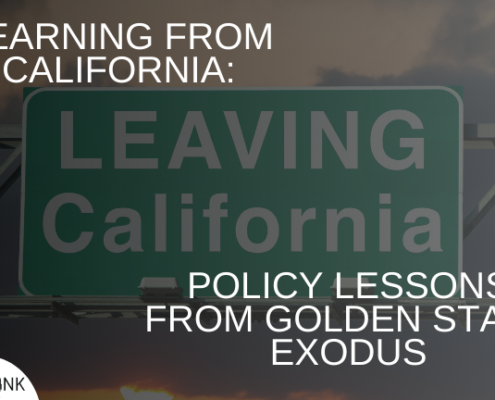
Learning From California: Policy Lessons From Golden State Exodus

New England Short Circuit: Distorted Incentives Drive Energy Prices Up and Reliability Down

Controlling Drug Prices: Costs and Benefits of Direct Negotiation with Big Pharma
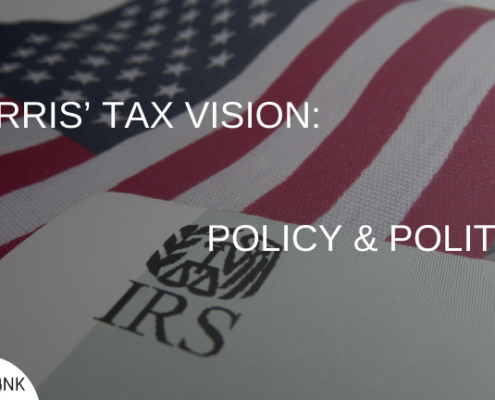
Harris’ Tax Vision: Policy & Politics
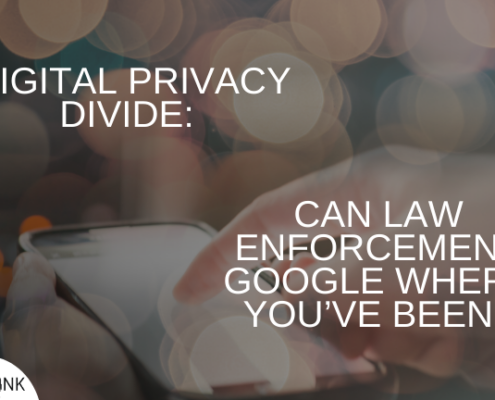
Digital Privacy Divide: Can Law Enforcement Google Where You’ve Been?

Housing Bond Bill: Could Billions Better Bay State Cost of Living
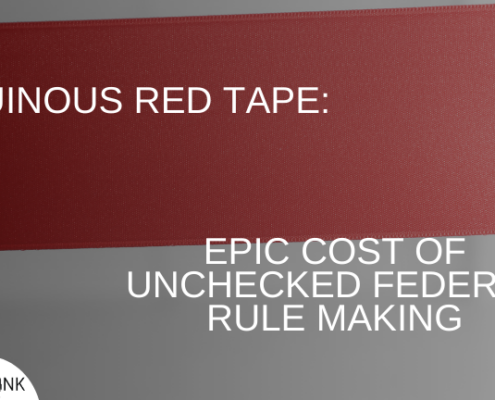
Ruinous Red Tape: Epic Cost of Unchecked Federal Rule Making
